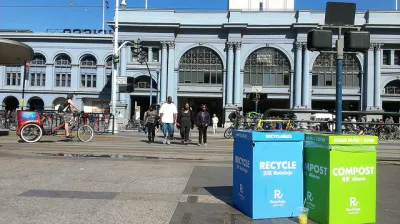In an effort to address climate change, San Francisco has a plan to get residents and businesses to do more than just recycle and compost.

Recycling and composting have long been a part of life in San Francisco. Now the city is leading the way with a no-waste initiative. It is asking other cities to join it in a commitment to decrease the amount of all waste and recyclables by 15 percent and the amount of material going to landfills by 50 percent by 2030.
To push beyond just recycling and composting, city leaders are coming up with ways to get more materials out of the waste stream. “Residents will have to voluntarily give up some of the stuff they buy, for example, and more pressure will have to be exerted on manufacturers to make things that don’t break down,” reports Kurtis Alexander.
San Francisco is hosting the Global Climate Action Summit, an event bringing together environmental activists and leaders from around the world, starting September 12. The Trump administration’s reversal of policies intended to curb climate change means more efforts are happening at the state and local levels:
Absent federal leadership, organizers of the San Francisco summit expect to roll out initiatives among cities, states and other subnational governments, as well as from businesses, with such climate goals as making buildings more energy efficient, increasing investment in environmentally friendly bonds and generating zero waste.
The city plans to promote its zero-waste initiative at the summit as a way to encourage other cities to reduce methane and energy use.
FULL STORY: S.F. invites world to join in zero-waste initiative

National Parks Layoffs Will Cause Communities to Lose Billions
Thousands of essential park workers were laid off this week, just before the busy spring break season.

Retro-silient?: America’s First “Eco-burb,” The Woodlands Turns 50
A master-planned community north of Houston offers lessons on green infrastructure and resilient design, but falls short of its founder’s lofty affordability and walkability goals.

Delivering for America Plan Will Downgrade Mail Service in at Least 49.5 Percent of Zip Codes
Republican and Democrat lawmakers criticize the plan for its disproportionate negative impact on rural communities.

Test News Post 1
This is a summary

Test News Headline 46
Test for the image on the front page.

Balancing Bombs and Butterflies: How the National Guard Protects a Rare Species
The National Guard at Fort Indiantown Gap uses GIS technology and land management strategies to balance military training with conservation efforts, ensuring the survival of the rare eastern regal fritillary butterfly.
Urban Design for Planners 1: Software Tools
This six-course series explores essential urban design concepts using open source software and equips planners with the tools they need to participate fully in the urban design process.
Planning for Universal Design
Learn the tools for implementing Universal Design in planning regulations.
EMC Planning Group, Inc.
Planetizen
Planetizen
Mpact (formerly Rail~Volution)
Great Falls Development Authority, Inc.
HUDs Office of Policy Development and Research
NYU Wagner Graduate School of Public Service


























